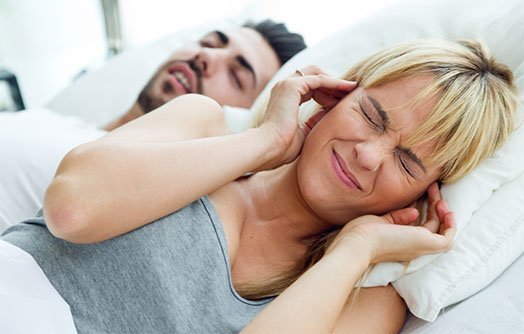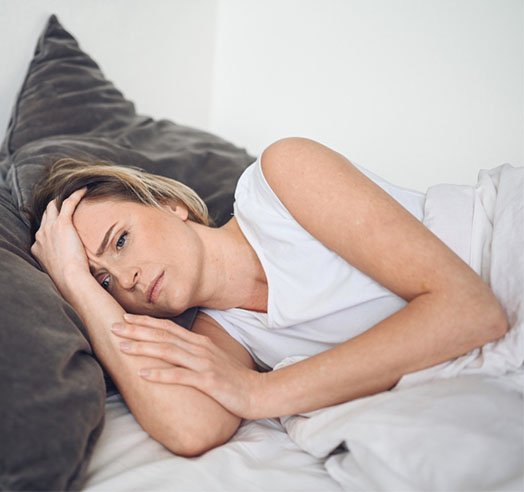Sleep Apnoea Treatment
Sleep Apnoea: Symptoms & Diagnosis
Sleep Apnoea Treatment Cheltenham
Snoring is more than just a noise made while sleeping – it is the soft palate vibrating, indicating that the airway is not properly open.

This is a sign that you may be at risk of having sleep apnoea, where the tongue falls in the throat and blocking your airway while sleeping.
The seemingly simple snoring can signal a potentially life-threatening disorder called obstructive sleep apnoea.
If left untreated, this condition can do much more damage than simply deny you and your partner a good night’s sleep.
Consult with your Cheltenham today!
Obstructive Sleep Apnoea
Obstructive sleep apnoea (OSA) is a condition in which breathing stops involuntarily for short periods of time while asleep.
Normally, air flows smoothly from the mouth and nose to the lungs at all times. Periods when breathing stops are called apnoea or apnoeic episodes.
In OSA, the flow of air is repeatedly stopped all night. The airflow stops because airway space in the throat becomes too narrow.
Snoring is characteristic of obstructive sleep apnoea. Snoring is commonly caused by the airflow squeezing through the narrowed airway space.
Untreated sleep apnoea can cause serious health problems such as:
- hypertension
- heart disease
- stroke
- diabetes
With proper diagnosis and treatment, complications can be prevented early on.
Symptoms of Sleep Apnoea
The main issue with sleep apnoea is that you may not be aware of the extent of your snoring or that you’re making gasping or choking noises while sleeping.
If you live alone, you may be unaware that you suffer from this condition. In some cases, heavy sleeping partners are equally unaware of your condition.

Aside from the loud snoring and episodes of gasping or choking, the symptoms of sleep apnoea include:
- Restlessness
- Insomnia
- Morning headaches
- Waking up with a sore, dry throat
- Excessive sleepiness during daytime and lack of energy
- Feeling drowsy during low stimulus activities
- Forgetfulness increased irritability and a decreased sex drive
These symptoms could well be the result of other conditions such as long work hours, the side effect of medicines (such as beta-blockers, antihistamines, sleeping tablets or others), chronic fatigue, alcohol abuse – and many more.
That’s why proper diagnosis is very important.
Treatment for Sleep Apnoea
At Dentist On Warrigal Cheltenham, we can screen for obstructive sleep apnoea and refer you to dentists who do OSA appliances.
Positive airway pressure. If you have OSA, you may benefit from positive airway pressure.
In this treatment, a machine transports air pressure through a piece that fits into your nose or placed over your nose and mouth while you sleep.
Positive airway pressure decreases the number of respiratory events that occur when you sleep, reduces daytime sleepiness and improves the quality of life.
The most common type is called continuous positive airway pressure.
In this treatment, the pressure of the air breathed is continuous, constant and greater than that of the surrounding air, which is enough to keep your upper airway passages open. This prevents OSA and snoring.
Laser-assisted uvulopalatoplasty reduces snoring in 90% of patients, but the success rate in patients with SDB is unclear. It may cause more scarring than UPPP, and it could potentially worsen apnoea.
Worsened OSA has been observed in the early postoperative period following laser-assisted uvulopalatoplasty.
Sleep Apnoea Treatment in Cheltenham
If you or someone you know suffers from sleep apnoea, contact your Cheltenham dentist right away.
Visit your Cheltenham dentist today!
Call us on (03) 9583 5506 or request your appointment online.
We are located at Suite C, 151 Centre Dandenong Road in Cheltenham.
Frequently Asked Questions
What causes sleep apnoea?
Structural issues, such as a large tongue and/or tonsils, can also increase your risk of developing the condition. Overweight people are also at a great risk of sleep apnoea.
